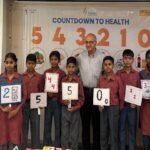He also visited the Emergency Operations Centre for Polio Eradication in Islamabad, Pakistan, where he commended the work of government and partners as “one team under one roof” and highlighted the critical importance of working closely with Afghanistan to prevent cross-border transmission.
“We must all give our best on this last mile to eradicate polio once and for all. My wish for 2019 is for zero polio transmission. You have WHO’s full support to help reach every child and stop this virus for good,” Dr Tedros said.
On his visit to Afghanistan on 5-6 January, Dr Tedros met with HE President Dr Ashraf Ghani, HE Chief Executive Dr Abdullah Abdullah, the Council of Ministers, representatives of key partners and nongovernmental organizations active in health.
Together with HE Minister of Public Health Dr Ferozuddin Feroz, he launched the newly developed Integrated Package of Essential Health Services. This package includes the most cost-effective evidence-based interventions that reflect the most common causes of mortality and morbidity in the country. It keeps the focus on primary health care but also adds noncommunicable diseases and trauma care. Dr Tedros confirmed WHO’s support to the government to develop financing options to help ensure access to health services for all Afghans.
Dr Tedros also visited the WHO-supported Trauma Care Hospital run by the Italian NGO Emergency in Kabul, where Dr Tedros thanked humanitarian workers for their important work. He praised the close collaboration between WHO, Ministry of Health and International NGOs like Emergency, so that provision of essential trauma care can be accessed by people who need it most.
In Pakistan on 7-8 January, Dr Tedros met with Prime Minister Imran Khan and several senior officials including Federal Minister for National Health Regulations & Coordination Mr Aamer, Mehmood Kiani, Minister of Foreign Affairs and Federal Minister for Human Rights Dr Shireen Mazari.
Dr Tedros accompanied the President of Pakistan, Arif Alvi, to the launch of the first Pakistan Nursing and Midwifery Summit and the Nursing Now campaign. Pakistan faces a critical shortage of health workers including nurses and midwives. The country needs more than 720 000 nurses to achieve universal health coverage by 2030.
He also visited a basic health centre in Shah Allah Ditta where WHO signed an agreement with the Government of Pakistan to develop a model health care system for universal health coverage in Islamabad. Dr Tedros commended the Government for its initiatives to tax tobacco and sugary drinks, as well as its plans to increase the health budget to 5% of GDP by 2023 (from the current 0.9% of GDP).
Dr Tedros chairs polio board
The visit took place shortly after WHO Director-General Dr Tedros Adhanom Ghebreyesus took over the Chair of the Polio Oversight Board, which guides and oversees the Global Polio Eradication Initiative – spearheaded by national governments, WHO, Rotary International, UNICEF, CDC and the Bill & Melinda Gates Foundation – as a clear sign that the eradication of this disease is a priority for WHO.
As recently as 30 years ago, wild poliovirus paralysed more than 350 000 children in more than 125 countries every year. In 2018 there were fewer than 30 reported cases in just two countries – Afghanistan and Pakistan.
Polio eradication requires high immunization coverage everywhere, worldwide, to block transmission of this extremely contagious virus. Unfortunately, children are still missing out on vaccination for various reasons including lack of infrastructure, remote locations, population movement, conflict and insecurity and resistance to vaccination.
Failure to eradicate polio from these last remaining strongholds could result in a resurgence of the disease, with as many as 200 000 new cases predicted worldwide every year within 10 years.







